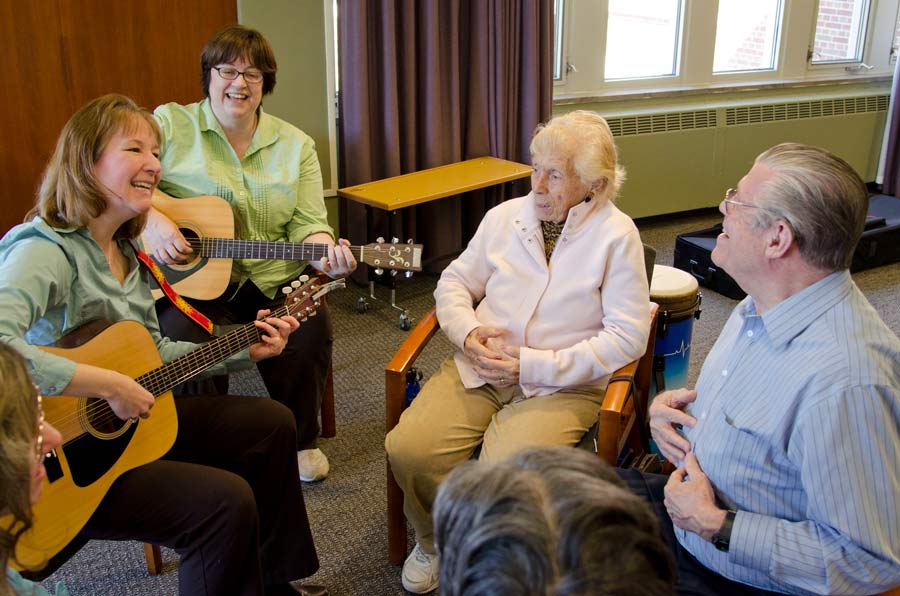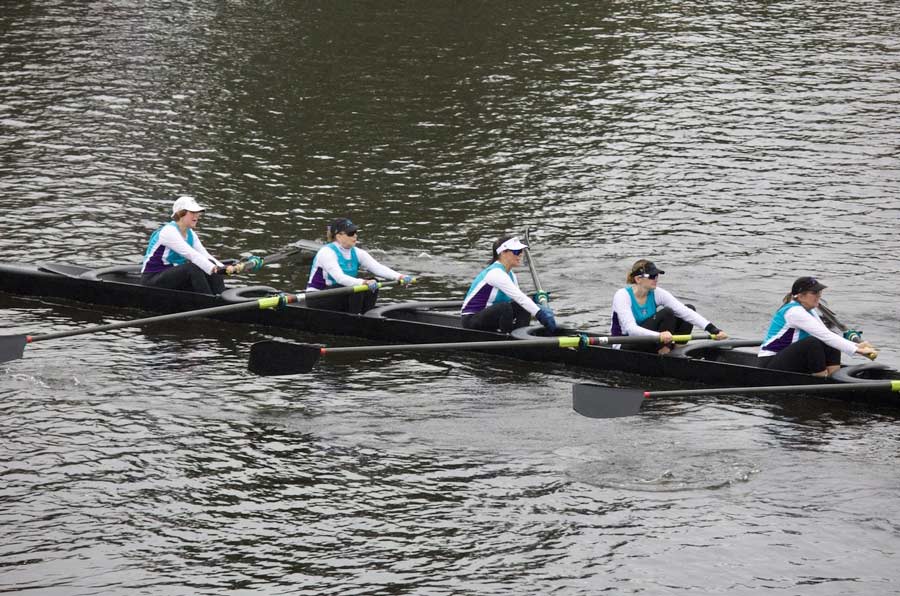Biography
Background and expertise
I've been teaching hands-on music therapy classes and supervising clinical work at Nazareth since 2009. It's incredibly rewarding to watch students develop their skills and identity as music therapists in these settings. Since coming to Naz, much of my scholarly work has focused on collaborative music therapy and speech-language therapy treatment for individuals affected by stroke. I also have prior experience working as a music therapist and internship director at the Mary Cariola Center in Rochester. As a result, working with children who have complex disabilities is also an area of expertise and interest for me.

Keough facilitates a music therapy session at Nazareth.
My academic passion
I'm particularly passionate about working interprofessionally with other disciplines. As a result, I've spent a lot of my time at Nazareth developing and supervising collaborative clinical opportunities.
Courses I teach
- Principles of Music Therapy
- Methods and Materials of Music Therapy
- Music Therapy Practicum
- Principles of Music Therapy Supervision
I love all the courses in the series I teach, but I'd say the music therapy practicum sequence is my favorite because I get to see students completely blossom — not only in their skills and knowledge, but also in their confidence. They're learning about what type of clinical setting or approach most resonates with them. It's exciting.
An incredible place
Nazareth is an amazing school for the study of music therapy. Students are so welcoming to one another and engaged in their community. All of our music therapy faculty are experienced clinicians who bring their own clinical stories and perspectives to their teaching. We build close, supportive relationships with students. Plus, every student gets the opportunity to train in both the on-campus clinics as well as in the community.
International opportunities
It's been inspiring to serve as an advisor for international service learning and solidarity trips to Nicaragua, Ecuador, South Africa, and Eswatini. Each trip has involved students from multiple majors learning together about the cultural norms and history of the country through engagement with those who live there. Everyone involved comes back with a stronger sense of the importance of studying and respecting cultural differences throughout their lives.
Ready for the world
Hearing about how successful our students and graduates are fills me with pride. Internship directors frequently tell us that our students are some of the most well-prepared they've encountered. Our graduates are working in all types of clinical settings across the country.
Advice: Learn from diversity
One of the most helpful ways that a student can prepare for working in music therapy is to get experience working or volunteering with individuals who are neurodiverse, elderly, and/or experiencing illness or disability, whether it be in a school setting, an eldercare facility, a hospital, or a summer camp. This helps you to better understand people as individuals who each have different life experiences, ways of communicating, strengths, and challenges.
School of Music Responsibilities
- Undergraduate Music Therapy Program Director
- Music Therapy Clinical Coordinator
- Principles of Music Therapy
- Methods and Materials of Music Therapy
- Music Therapy Practicum
- Principles of Music Therapy Supervision
- Supervise Music Therapy Practicum Students
Education
- Nazareth College, MS.Ed.
- Nazareth College, B.S.

That's Keough at the back of the boat, rowing at the Head of the Charles regatta.
Fun fact
Students are often surprised to learn that I'm a passionate rower. I row on a master's crew team in town and this year rowed in the Head of the Charles regatta — a bucket list item for every rower. We talk a lot with our students about self-care, and rowing is my self-care strategy.
Student Perspective
"Laurie Keough is the reason I was able to do clinical work when I studied abroad in Italy. Her unwavering support from thousands of miles away gave me the confidence I needed to make genuine connections with my clients. Laurie goes above and beyond to push her students to be their very best as well as to advance the music therapy program at Naz."
- Juliana Joyce '20, bachelor's degree in music therapy, who went on to work as a music therapist at Monroe-Orleans BOCES